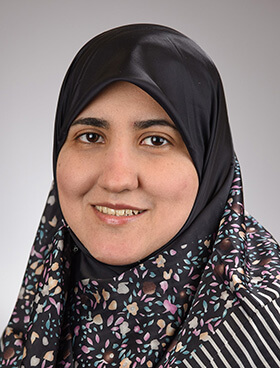June 11, 2021:
Big Ten Cancer Research Consortium investigators presented six abstracts during the American Society of Clinical Oncology (ASCO) 2021 Annual Meeting held virtually June 4-8.
BTCRC-BRE15-016
 Oana C. Danciu, MD, associate professor at the University of Illinois at Chicago and leader of the University of Illinois Cancer Center Phase I group, presented a poster (Abstract 1056) on BTCRC-BRE15-016, a single-arm phase II trial of palbociclib in combination with tamoxifen as first-line therapy for metastatic hormone receptor-positive breast cancer. The study tested whether adding palbociclib to tamoxifen might improve response rates in patients with newly diagnosed advanced hormone receptor positive, HER2 negative (HR+/HER2-) breast cancer. Between June 2016 and July 2019, 49 patients (47 evaluable) were enrolled in the study, 23 with de-novo metastatic disease and 24 with recurrent breast cancer. Results of the study showed palbociclib and tamoxifen were tolerable and could be an alternative approach for select patients in first-line treatment of HR+ metastatic breast cancer. Authors include: Oana Cristina Danciu, Kent Hoskins, Cristina I. Truica, Anne Hudson Blaes, Deimante Tamkus, Jatin Rana, Pavankumar Tandra, Lauren Green, Menggang Yu, Qianqian Zhao, Deborah Toppmeyer, Ruth O’Regan, and Kari Braun Wisinski. See abstract.
Oana C. Danciu, MD, associate professor at the University of Illinois at Chicago and leader of the University of Illinois Cancer Center Phase I group, presented a poster (Abstract 1056) on BTCRC-BRE15-016, a single-arm phase II trial of palbociclib in combination with tamoxifen as first-line therapy for metastatic hormone receptor-positive breast cancer. The study tested whether adding palbociclib to tamoxifen might improve response rates in patients with newly diagnosed advanced hormone receptor positive, HER2 negative (HR+/HER2-) breast cancer. Between June 2016 and July 2019, 49 patients (47 evaluable) were enrolled in the study, 23 with de-novo metastatic disease and 24 with recurrent breast cancer. Results of the study showed palbociclib and tamoxifen were tolerable and could be an alternative approach for select patients in first-line treatment of HR+ metastatic breast cancer. Authors include: Oana Cristina Danciu, Kent Hoskins, Cristina I. Truica, Anne Hudson Blaes, Deimante Tamkus, Jatin Rana, Pavankumar Tandra, Lauren Green, Menggang Yu, Qianqian Zhao, Deborah Toppmeyer, Ruth O’Regan, and Kari Braun Wisinski. See abstract.
Xiuyuan Ma, PhD, a postdoctoral researcher at the University of Illinois College of Medicine at Chicago, presented a poster (Abstract 1030), also on BTCRC-BRE15-016, for the Biologic Correlates subtrack, covering deep proteomic analysis of plasma exosomes in patients with advanced, hormone receptor-positive breast cancer treated with palbociclib and tamoxifen. Using the team’s ultrasensitive proteomic method, results of this analysis detected more than 500 exosome proteins from as little as 100 ng of purified exosomes and a significant enrichment of exosome-specific markers were observed when comparing subjects to healthy donor samples. Researchers reported that this method provided an unparalleled portrait of the proteomic landscape of plasma exosomes during treatment with CDK4/6i endocrine therapy and could provide novel insights into mechanisms of resistance that emerge during treatment. Authors include: Xiuyuan Ma, Yu Gao, Gayatry Mohapatra, Louis Coleman, Yael Simons, Cristina I. Truica, Anne Hudson Blaes, Jatin Rana, Pavankumar Tandra, Lauren Green, Menggang Yu, Deborah Toppmeyer, Ruth O’Regan, Kari Braun Wisinski, Oana Cristina Danciu, and Kent Hoskins. See abstract.
BTCRC-LUN15-029
 Nikhil Shukla, MD, MS, a Hematology/Oncology Fellow at Indiana University School of Medicine, presented a poster (Abstract 9073) on BTCRC-LUN15-029, a phase II trial of chemotherapy plus pembrolizumab in patients with advanced non-small cell lung cancer (NSCLC) previously treated with PD-1 or PD-L1 inhibitor. In this study, 35 participants received pembrolizumab plus the next-line chemotherapy (gemcitabine, docetaxel, or pemetrexed). Results show pembrolizumab plus next-line chemotherapy was associated with prolonged progression free survival in patients with advanced NSCLC who experienced disease progression after clinical benefit to chemotherapy plus a checkpoint inhibitor, compared to historical controls of single-agent chemotherapy. Authors include: Nikhil Shukla, Sandra K. Althouse, Susan Perkins, Muhammad Furqan, Ticiana Leal, Nasser H. Hanna, and Greg A. Durm, sponsor-investigator. See abstract.
Nikhil Shukla, MD, MS, a Hematology/Oncology Fellow at Indiana University School of Medicine, presented a poster (Abstract 9073) on BTCRC-LUN15-029, a phase II trial of chemotherapy plus pembrolizumab in patients with advanced non-small cell lung cancer (NSCLC) previously treated with PD-1 or PD-L1 inhibitor. In this study, 35 participants received pembrolizumab plus the next-line chemotherapy (gemcitabine, docetaxel, or pemetrexed). Results show pembrolizumab plus next-line chemotherapy was associated with prolonged progression free survival in patients with advanced NSCLC who experienced disease progression after clinical benefit to chemotherapy plus a checkpoint inhibitor, compared to historical controls of single-agent chemotherapy. Authors include: Nikhil Shukla, Sandra K. Althouse, Susan Perkins, Muhammad Furqan, Ticiana Leal, Nasser H. Hanna, and Greg A. Durm, sponsor-investigator. See abstract.
BTCRC-LUN17-127
 Jyoti Malhotra, MD, MPH, assistant professor of medicine at Robert Wood Johnson Medical School and a medical oncologist at Rutgers Cancer Institute of New Jersey, presented a poster (Abstract 8570) on BTCRC-LUN17-127, a phase I trial of plinabulin in combination with nivolumab and ipilimumab in patients with relapsed small cell lung cancer (SCLC). This study aimed to determine dose-limiting toxicities and recommended phase 2 dose using a 3+3 design of plinabulin, nivolumab, and ipilimumab in SCLC, while reducing immune-related adverse events. Investigators concluded that the combination was safe and well tolerated. The study included 17 participants with extensive-stage SCLC and opened in 2018. A phase II study in checkpoint inhibition (CPI)-experienced patients with relapsed SCLC is planned to confirm preliminary signals of clinical activity and reduced immune toxicity. Authors include: Jyoti Malhotra, Nasser H. Hanna, Alberto Chiappori, Lawrence Eric Feldman, Naomi Fujioka, Igor I. Rybkin, Shadia Ibrahim Jalal, Malini Patel, Dirk Moore, Chunxia Chen, and Salma K. Jabbour. See abstract.
Jyoti Malhotra, MD, MPH, assistant professor of medicine at Robert Wood Johnson Medical School and a medical oncologist at Rutgers Cancer Institute of New Jersey, presented a poster (Abstract 8570) on BTCRC-LUN17-127, a phase I trial of plinabulin in combination with nivolumab and ipilimumab in patients with relapsed small cell lung cancer (SCLC). This study aimed to determine dose-limiting toxicities and recommended phase 2 dose using a 3+3 design of plinabulin, nivolumab, and ipilimumab in SCLC, while reducing immune-related adverse events. Investigators concluded that the combination was safe and well tolerated. The study included 17 participants with extensive-stage SCLC and opened in 2018. A phase II study in checkpoint inhibition (CPI)-experienced patients with relapsed SCLC is planned to confirm preliminary signals of clinical activity and reduced immune toxicity. Authors include: Jyoti Malhotra, Nasser H. Hanna, Alberto Chiappori, Lawrence Eric Feldman, Naomi Fujioka, Igor I. Rybkin, Shadia Ibrahim Jalal, Malini Patel, Dirk Moore, Chunxia Chen, and Salma K. Jabbour. See abstract.
BTCRC-LUN17-139
 Fatemeh Ardeshir-Larijani, MD, a Hematology-Oncology fellow at Indiana University School of Medicine, presented a poster (Abstract 9034) on BTCRC-LUN17-139, a phase II trial of atezolizumab + carboplatin + pemetrexed + bevacizumab in patients with stage IV non-squamous non-small cell lung cancer. Thirty patients were enrolled in the study between 2018 and 2020. Investigators concluded that atezolizumab + carboplatin + bevacizumab was associated with longer disease control rate, progression-free survival, and overall survival than historical controls. Three on-treatment deaths occurred, possibly related to therapy (more likely bevacizumab), which prompted early closure of the study. A phase III study evaluating this regimen is ongoing by another group. Authors include: Fatemeh Ardeshir-Larijani, Sandra K. Althouse, Ticiana Leal, Lawrence Eric Feldman, Taher Abu Hejleh, Malini Patel, Ryan D. Gentzler, Adam Ryan Miller, and Nasser H. Hanna. See abstract.
Fatemeh Ardeshir-Larijani, MD, a Hematology-Oncology fellow at Indiana University School of Medicine, presented a poster (Abstract 9034) on BTCRC-LUN17-139, a phase II trial of atezolizumab + carboplatin + pemetrexed + bevacizumab in patients with stage IV non-squamous non-small cell lung cancer. Thirty patients were enrolled in the study between 2018 and 2020. Investigators concluded that atezolizumab + carboplatin + bevacizumab was associated with longer disease control rate, progression-free survival, and overall survival than historical controls. Three on-treatment deaths occurred, possibly related to therapy (more likely bevacizumab), which prompted early closure of the study. A phase III study evaluating this regimen is ongoing by another group. Authors include: Fatemeh Ardeshir-Larijani, Sandra K. Althouse, Ticiana Leal, Lawrence Eric Feldman, Taher Abu Hejleh, Malini Patel, Ryan D. Gentzler, Adam Ryan Miller, and Nasser H. Hanna. See abstract.
BTCRC-LUN18-153
 Greg A. Durm, MD, assistant professor of clinical medicine in the Department of Medicine, Division of Hematology/Oncology at the Indiana University School of Medicine, presented a poster (Abstract TPS8583) on BTCRC-LUN18-153, a randomized phase II trial of adjuvant pembrolizumab versus observation following curative resection for stage I NSCLC with primary tumors between 1-4 cm. The study opened in May 2020 and will enroll up to 368 patients who are randomized 1:1 to either the pembrolizumab or observation arm. The primary endpoint is disease free survival and secondary endpoints include overall survival, disease free survival at 1-, 2-, and 3-year time points, and toxicity. Authors include: Greg A. Durm, Muhammad Furqan, Lawrence Eric Feldman, Malini Patel, Richard Delmar Hall, Shadia Ibrahim Jalal, Thomas J. Birdas, Kenneth Kesler, Karen Marie Rieger, DuyKhanh Ceppa, and Nasser H. Hanna. See abstract.
Greg A. Durm, MD, assistant professor of clinical medicine in the Department of Medicine, Division of Hematology/Oncology at the Indiana University School of Medicine, presented a poster (Abstract TPS8583) on BTCRC-LUN18-153, a randomized phase II trial of adjuvant pembrolizumab versus observation following curative resection for stage I NSCLC with primary tumors between 1-4 cm. The study opened in May 2020 and will enroll up to 368 patients who are randomized 1:1 to either the pembrolizumab or observation arm. The primary endpoint is disease free survival and secondary endpoints include overall survival, disease free survival at 1-, 2-, and 3-year time points, and toxicity. Authors include: Greg A. Durm, Muhammad Furqan, Lawrence Eric Feldman, Malini Patel, Richard Delmar Hall, Shadia Ibrahim Jalal, Thomas J. Birdas, Kenneth Kesler, Karen Marie Rieger, DuyKhanh Ceppa, and Nasser H. Hanna. See abstract.
About the Big Ten Cancer Research Consortium: The Big Ten Cancer Research Consortium was created in 2013 to transform the conduct of cancer research through collaborative, hypothesis-driven, highly translational oncology trials that leverage the scientific and clinical expertise of Big Ten universities. The goal of the Big Ten Cancer Research Consortium is to create a unique team-research culture to drive science rapidly from ideas to new approaches to cancer treatment. Within this innovative environment, today’s research leaders collaborate with and mentor the research leaders of tomorrow with the unified goal of improving the lives of all patients with cancer.
About the Big Ten Conference: The Big Ten Conference is an association of world-class universities whose member institutions share a common mission of research, graduate, professional and undergraduate teaching and public service. Founded in 1896, the Big Ten has sustained a comprehensive set of shared practices and policies that enforce the priority of academics in the lives of students competing in intercollegiate athletics and emphasize the values of integrity, fairness and competitiveness. The broad-based programs of the 14 Big Ten institutions will provide over $200 million in direct financial support to more than 9,800 students for more than 11,000 participation opportunities on 350 teams in 42 different sports. The Big Ten sponsors 28 official conference sports, 14 for men and 14 for women, including the addition of men’s ice hockey and men’s and women’s lacrosse since 2013. For more information, visit www.bigten.org.














Subscribe to the Big Ten CRC Newsletter X
X Facebook
Facebook YouTube
YouTube